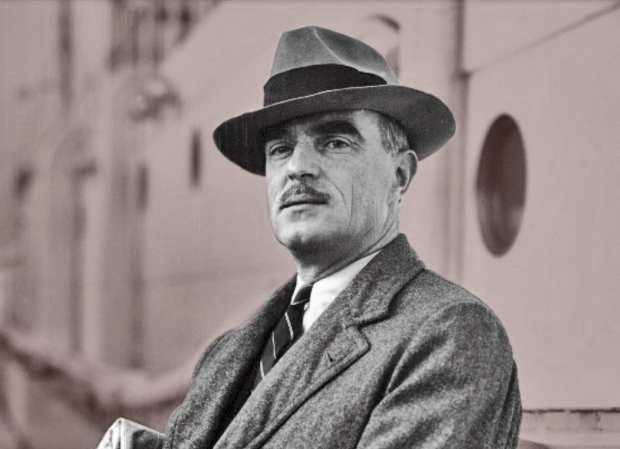
Gertrude Stein and Thornton Wilder met in Chicago for the first time in 1934. Stein had returned to America to embark on an extensive speaking tour after the publication of her landmark book, The Autobiography of Alice B. Toklas, published in 1933, whose bewildering, non-traditional prose made her an avant-garde cause célèbre both in Europe and in America, where she was born. Their correspondence, which ran for over ten years, is animated by an energetic effervescence: the letters are a fascinating admixture of erudition and playfulness. Wilder’s mention of Jean Giraudoux’s reimagining of Sophocles’ Electra, and of the various art galleries he attended in the city, are testament to the vibrant culture of Paris in the ’30s. Stein’s work as part of the “Comite d’Action” at the Petit Palais introduced the broader public to the paintings of artists like Matisse and Cézanne.
18 July, 1937
34 rue des Mathurins, Paris
Dear Friends:
All the ten people I know in Paris have left Paris, so I’m a little lonely and cranky and shall write a letter.
The two American girls have rented a car and gone South. The lady I sat at table with on the boat has gone to Holland. Sibyl Colefax has gone with some worldlings to visit some worldlings in the country. Last night I hardly slept a wink and at four-thirty could be found sitting up in bed reading A Long Gay Book. I never have been able to sleep well in the great city of Paris anyway—I who sleep perfectly everywhere else in the world.
I’ve seen a lot of paintings. The new Palais des Arts; the Petit Palais—so proud to see that Gertrude is on the Comite d’Action and has all those pictures there; the El Greco show; and the Maitres Populaires show from Grenoble.
The insomnia last night was partly do [sic] to the impertinent champagne of Giraudoux’s Electre, a lot of adorable pirouetting under the great vaults of the fearful story. As one critic said of Sophocles’ treatment of the same subject: a mixture of matricide and high spirits.
Yesterday I took out one of my American girls and Madame Bousquet and gave them a delicious and expensive luncheon at Lucas’. When Mme Bousquet knew I knew you she opened her not exactly inert arms and gave me a big kiss. (Lord! Seems like I spend a great deal of my time meditatively brushing lip-stick off my cheeks). I liked her very much.
Very interesting thing happened:
Two of the personages that have some bearing on Ida: A Novel almost collided.
Conversation in a taxi:
Sibyl: Now I have something very embarrassing to lay before you. The couple at Bessalogne (my guess as to this name) has asked us to come and stay with them.
Thornton: ?
Sibyl: I can’t imagine how they knew. I don’t suppose there are four people in all London whom I told that I was to be seeing you in Salzburg. But they seem to have heard of it some way. She writes “…and we should like it very much if you bring Mr. Thornton Wilder with you.”
Thornton: ?
Sibyl: Why, the Windsors.
Thornton: !!!!!!
Sibyl: But I really don’t recommend it, unless for curiosity etc you would like to. On the way down to Italy I shall arrange to stop over for lunch. It represents many genes [embarrassments] of all kinds…..friends whom I perfectly adore, but who have made one foolish mistake after another…..They don’t really speak our language…..and I can’t say I really recommend it, but since the invitation was sent I merely pass it on to you.
Wasn’t that a funny thing?
Banquet de Tantale; banquet barmecide.
Tomorrow at 10:30 I shall be sitting at the conference table. Shall I be called on soon? I have about six little speeches all ready, depending in which direction the discussion takes.
Oh, and I’ve stolen from Gertrude’s ideas with both hands. Yes, defense of the American’s right to remake himself a language from the fabric of the English language with a diagram of the difference between the American and English minds. All Gertrude. And in answer to Paul Valery’s question as to how the masterpieces of the future will be paid for in an age when there are no patrons, no elite and so on, I rush in with a garbled account of the doctrine that there never has been any relation between the moment of creation and the element of audience and I deduce some of the practical implications. Gertrude’s inadequate but adoring little beau page, chevalier errant, and missioner. I feel like some brand-new Chinese convert, ardent but immature, who tears about Nanking mixing up his lessons pele-mele and saying that a Christian must turn his back on his family, expect the end of the world any minute, and must lose no opportunity to provoke his own martyrdom.
I wish I were safe and sound in Bilignin, that’s what I wish.
Or sitting of a morning on a terrasse in Belley waiting for a car to come hurtling by, containing two busy shoppers that I love.
Or that we three were ensconced therein roaming the countryside searching for chevalier-fish, or for rural ancestral pates.
That’s what I wish.
Love,
Thornton
From The Letters of Gertrude Stein and Thornton Wilder. Edited by Edward Burns, Ulla E. Dydo, and William Rice. New Haven, CT: Yale UP, 1996. p. 155-156.
FURTHER READING
Read an essay by Michael Dirda about Wilder’s laudable prose style.
Read an assessment of Gertrude Stein’s little-read Ida: A Novel, which Wilder mentions in his letter.
Read Gertrude Stein’s A Long Gay Book, published in 1933, at the University of Adelaide.


